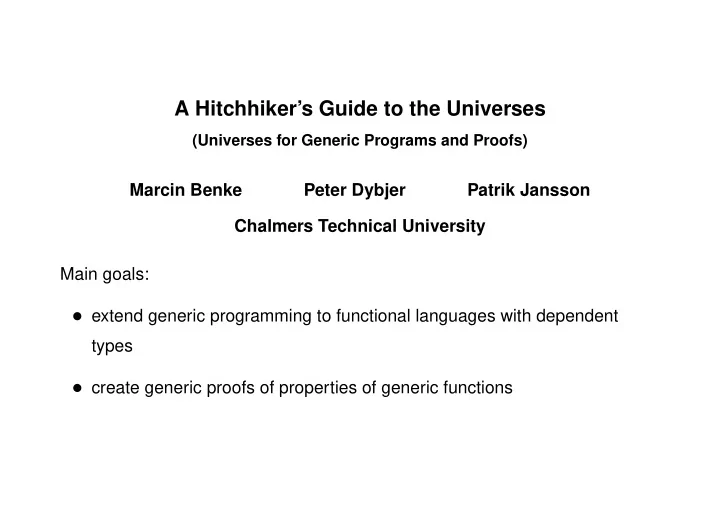

A Hitchhiker’s Guide to the Universes (Universes for Generic Programs and Proofs) Marcin Benke Peter Dybjer Patrik Jansson Chalmers Technical University Main goals: • extend generic programming to functional languages with dependent types • create generic proofs of properties of generic functions
Generic functional programming • Basic idea: define generic functions by induction on the definition of a data type • Examples: – generic Boolean equality: SML (built-in) and Haskell (derivable class) – generic map combinators, and generic iteration and recursion over inductive datatypes • Benefits : – highly reusable and adaptive definitions – well suited for building libraries of programs, theorems and proofs
Related work: Generic programming: • ’85 B¨ ohm & Berarducci (universal algebra) • ’91 Backhouse et al. (Squiggol), • ’93 Bird et al. (generic functional programming), • ’95 Jay (shape polymorphism), • ’97 Jansson & Jeuring (polytypic programming) • ’02 Hinze & Jeuring (Generic Haskell). Generic programming and dependent types: • ’99 Dybjer & Setzer (generic dependent type theory: IIR) • ’99 Pfeifer & Rueß (first polytypic proof) • ’02 Altenkirch & McBride; Norell (Generic Haskell in Type Theory)
Dependent types Examples : • Vect n — vectors (lists) of length n • data structures with invariants: ordered lists, balanced trees, AVL-trees, red-black-trees, etc. • In general: we can express more or less arbitrary properties of programs and data structures. • Universe of codes for datatypes — the natural setting for generic programming The ideas presented in this talk have been implemented and tested using the Alfa proof editor.
Universes • A universe consists of – a set of codes for datatypes: Sig : Set – a decoding function: T : (Σ : Sig ) → Set • Example : Sig = Bool and T = Tr Tr : Bool → Set = Tr False Void = Tr True Unit
A universe for single-sorted algebras Consider the class of term algebras T Σ for a one-sorted signature Σ . Such a signature is a list of arities of the operations. Examples are: • the empty type with Σ = [ ] , • the booleans with Σ = [0 , 0] , lists of booleans with Σ = [0 , 1 , 1] , • the natural numbers with Σ = [0 , 1] , • and binary trees without information in the nodes with Σ = [0 , 2] . This universe is described by the set of signatures Sig = [ Nat ] , and the decoding function T : Sig → Set , which maps a signature to (the carrier of) its term algebra.
Generic programs and proofs We define generic functions, e.g. : (Σ : Sig ) → T Σ → Nat size : (Σ : Sig ) → T Σ → T Σ → Bool eq and proofs : (Σ : Sig ) → ( x : T Σ ) → Tr (eq Σ x x ) reflexivity : (Σ : Sig ) → ( x, y : T Σ ) → Tr (eq Σ x y ) → substitutivity ( P : T Σ → Set) → ( P x ) → ( P y ) To do this we introduce a generic iterator and recursor for T Σ . Functions and proofs are defined by applying the iterator (or the recursor) to a step-function which is in turn defined by induction on Σ .
More Universes By varying the definition of Sig, we can create generic programs and proofs in various settings: • Iterated induction: Sig = [ Arity ] and Arity = data Zero | Rec Arity | NonRec Arity Arity • Parameterized algebraic types: Arity = data Zero | Rec Arity | NonRec Arity Arity | Par Arity • . . . with n parameters: Arity ( n : Nat ) = data Zero | Rec Arity | NonRec Arity Arity | Par ( Fin n ) Arity • Generalized induction: Sig = [Set] • Generalized iterated induction: Sig = [ Sig ] • Inductive families indexed by I : Sig I = data Nil | NonRec ( A : Set )( A → Sig I ) | Rec I Sig I
Formal theory We work in versions of Martin-L¨ of type theory, each consisting of: • Rules for the logical framework (as in Martin-L¨ of) • Rules for the universe Sig • Generic formation, introduction, elimination and equality rules for T Σ .
Conclusions • Dependent types are the natural setting for generic programming. • This setting allows generic proofs as well as generic functions. • Our approach works for a wide range of universes, including inductive families. • All of these have been implemented and tested using the Alfa proof editor.
Recommend
More recommend